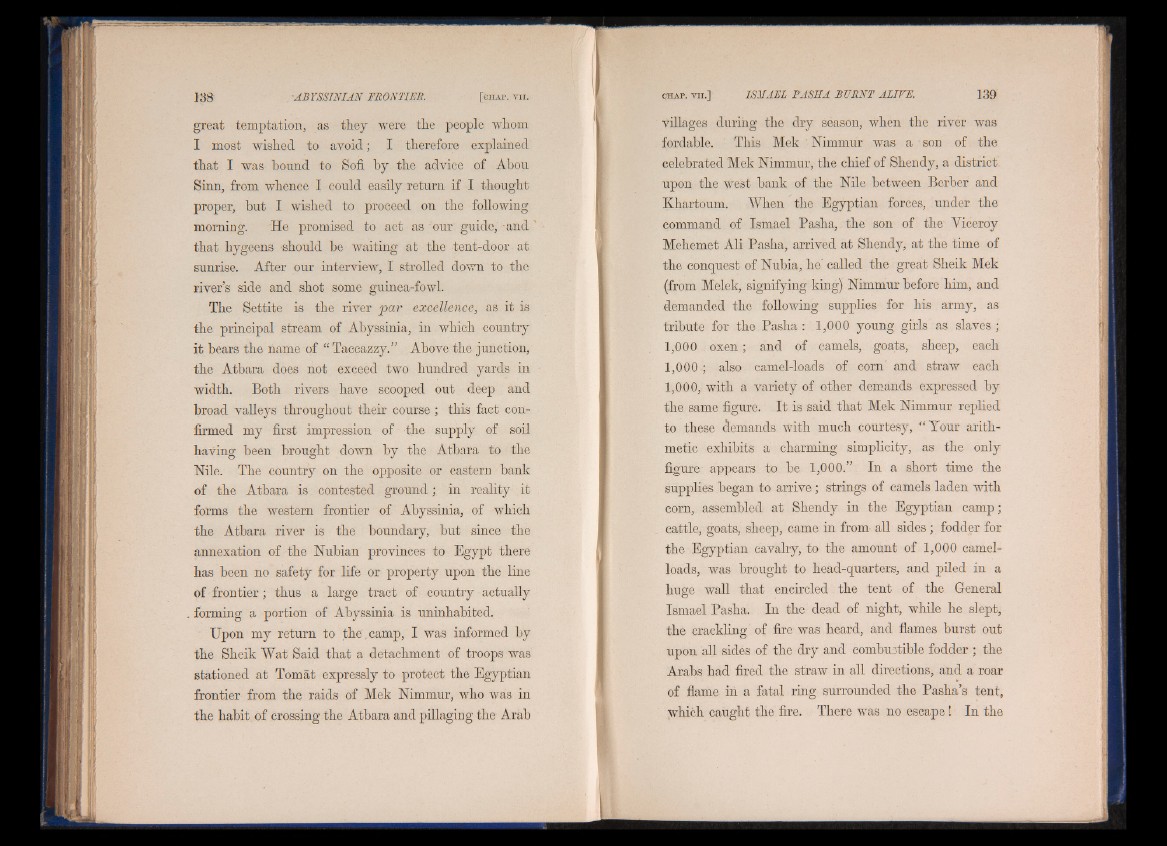
great temptation, as they were the people whom
I most wished to avoid; I therefore explained
that I was bound to Sofi by the advice of Abou
Sinn, from whence I could easily return if I thought
proper, but I wished to proceed on the following
morning. He promised to act as our guide, and
that hygeens -should be waiting at the tent-door at
sunrise. After our interview, I strolled down to the
river’s side and shot some guinea-fowl.
The Settite is the river par excellence, as it is
the principal stream of Abyssinia, in which country
it bears the name of “Taccazzy.” Above the junction,
the Atbara does not exceed two hundred yards in
width. Both rivers have scooped out deep and
broad valleys throughout their course; this fact confirmed
my first impression of the supply of soil
having been brought down by the Atbara to the
Nile. The country on the opposite or eastern bank
of the Atbara is. contested ground j in reality it
forms the western frontier of Abyssinia, of which
the Atbara river is the boundary, but since the
annexation of the Nubian provinces to Egypt there
has been no safety for life or property upon the line
of frontier; thus a large tract of country actually
forming a portion of Abyssinia is uninhabited.
Upon my return to the , camp, I was informed by
the Sheik Wat Said that a detachment of troops was
stationed at Tomat expressly to protect the Egyptian
frontier from the raids of Mek Nimmur, who was in
the habit of crossing the Atbara and pillaging the Arab
villages during the dry season, when the river was
fordable. This Mek ' Nimmur was a son of the
celebrated Mek Nimmur, the chief of Shendy, a district
upon the west bank of the Nile between Berber and
Khartoum. When the Egyptian forces, under the
command of Ismael Pasha, the son of the Viceroy
Mehemet Ali Pasha, arrived at Shendy, at the time of
the conquest of Nubia, he' called the great Sheik Mek
(from Melek, signifying king) Nimmur before him, and
demanded the folloAving supplies for his army, as
tribute for the Pasha : 1,000 young girls as slaves;
1.000 oxen; and of camels, goats, sheep, each
1.000 ; also camel-loads of corn and straw each
1,000, with a variety of other demands expressed by
the same figure. It is said that Mek Nimmur replied
to these demands with much courtesy, “ Your arithmetic
exhibits a charming simplicity, as the only
figure appears to be 1,000.” In a short time the
supplies began to arrive; strings of camels laden with
corn, assembled at Shendy in the Egyptian camp;
cattle, goats, sheep, came in from- all sides; fodder for
the Egyptian cavalry, to the amount of 1,000 camelloads,
was brought to head-quarters, and piled in a
huge wall that encircled the tent of the General
Ismael Pasha. In the dead of night, while he slept,
the crackling of fire was heard, and flames burst out
upon all sides of the dry and combustible fodder ; the
Arabs had fired the straw in all directions, and a roar
of flame in a fatal ring surrounded the Pasha’s tent,
which caught the fire. There was no escape! In the